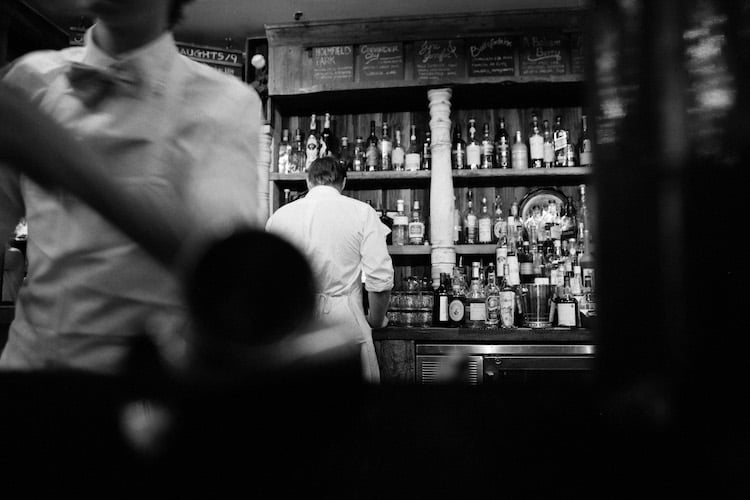Fixed Cost For A Restaurant
Average Eating place Costs: Liquor, Food, and Labor

// By Jordan Brydges // , Oct two, 2019
Topics: Liquor Price
In that location are many costs that become into running a restaurant and while some are not controllable, others are, and taking advantage of lowering those costs will lead to a successful business. The costs that are easiest to control in a restaurant include, or what some call "The Big Three": Nosotros will go over each in more detail and the manufacture averages and testify y'all how to calculate them so you tin see how your costs are impacting your concern. The sum of your Cost of Goods Sold (COGS) for food and beverage and labor costs is called your prime costs. These costs include food and beverage inventory, labor, payroll taxes, any workers' compensation, medical insurance, and employee benefits. Your prime costs will give you an indication of how much you should accuse in gild to say profitable and how much yous tin spend without running yourself into debt. Total COGS + Total Labor = Prime Costs Only in case you forgot how to calculate COGS here is the formula: Get-go Inventory + Purchases - Catastrophe Inventory = COGS Beginning Inventory = the amount of food and beverage you started with on your shelves for a certain period. Purchases = the corporeality of food and drinkable you bought for a certain period. Ending Inventory = the amount of food and beverage left over for a sure period. You will also desire to compare your prime number costs to your total sales to see if you are within a good for you range. Prime Price as Percent of Sales = Prime Cost/Total Sales Ideally you would want your prime costs to exist between 55-65% and the balance goes to other expenses similar rent, new equipment, utilities and menu pattern. Anything less than 50% can point your food quality is low, you are charging too much, or have too little staff. On the other hand, anything over lxx% makes it hard to be profitable considering y'all only have 30% to become to your other expenses such as rent, insurance and utilities. For example, say your labor costs were $four,000 for a given menses and your food and beverage COGS were $viii,000. Your prime costs would be $12,000. (four,000 + 8,000) = $12,000. At present say your total sales for the menstruum were $19,000. Your prime cost every bit a percent would be 63% (12,000 / xix,000 10 100) = .63 or 63%. 63% is in the ideal range for a prime cost pct and this means you have 37% that tin be allocated for rent, utilities, insurance and other expenses and also profits. Now that we've gone over how much your prime costs should ideally be, we tin dive in and see what the typical costs are for liquor, food, and labor for a restaurant or bar. Patently every bar and restaurant would love to keep their liquor costs as low as possible, considering the lower the liquor costs, the greater the profits. Your liquor costs are based on your direct costs and gross margin and every place has different costs to take into account that will affect liquor costs. The industry average for total beverage programs is between 18-24%. Every drinkable type has a different cost pct as well. Liquor is well-nigh xv%, draft beer about xx%, bottled beer effectually 25%, and wine can be upwards of xxx-xl%. To calculate your liquor costs, y'all want to take your Price of Goods Sold and split by total sales. COGS/Liquor Sales = Liquor Costs For example, if for the yr your bar sold $15,000 of liquor inventory and it generated sales of $65,000 then your liquor price percent would be 23%. And so every dollar in sales means 23 cents is used to pay for the liquor and the other 77 cents is your gross margin. Think that gross margin is the corporeality of sales revenue after taking out the costs to produce the particular. (15,000/65,000) = .23 x 100 = 23% Considering of slim margins, controlling food costs is i of the biggest challenges for eating place operators. By monitoring these costs closely you will know when to adjust prices, buy unlike products or quantities, or change distributors. Typically the average nutrient costs are around 28-35% to remain profitable. Your COGS for nutrient is the amount you spend on ingredients for each dish and inventory for a given time catamenia. To summate actual food costs utilise the post-obit formula: Food Cost Percentage = Beginning Inventory + Purchases - Ending Inventory / Food Sales For example, let'southward say you had $eight,000 in beginning inventory, purchases of $one,500 and an ending inventory of $7,500 and $6,000 in sales for a given period. You would have a food toll of 33% so for every dollar in sales it costs y'all 33 cents. ($eight,000 + 1,500) - 7,500 / vi,000 = .33 x 100 = 33% Anyone can add up food costs, but without comparing it to something what does information technology even mean? Looking at your ideal nutrient costs can show yous any inconsistencies between your food cost percentage and your bodily nutrient toll. Different actual food costs, platonic nutrient costs practise non consider kickoff and ending inventories, but looks at total costs and sales. The formula for ideal food costs is: Ideal Nutrient Cost Percentage = Full Cost Per Dish / Full Sales Per Dish For example, say your total toll per dish is $ane,500 and total sales per dish is $6,000. Your ideal food cost percentage would be 25%. ($one,500 / six,000) = .25 or 25% So looking at the ideal food price percentage and the actual nutrient price per centum nosotros can encounter there is a 8% difference (33% - 25%). This percent departure tin can come from food waste or over ordering, which now that we know this we tin can accept steps to reduce costs. First of all, what is labor price? Y'all might be thinking it is merely your hourly wages and salaried employees, but there is more than to information technology. Labor costs are anything that is labor-related and include: A proficient dominion of pollex is to aim to keep labor costs between twenty-30% of gross acquirement. With that being said, every establishment is dissimilar and sometimes y'all require more staff on paw than usual that might increment your costs and other times yous are able to cut staff to reduce labor costs. A fast-food eatery could typically run labor costs around 25% while a full service restaurant could run about xxx-forty% of revenue depending on how up calibration the bar or eating house is and the demand needed. In gild to make up one's mind what your eating place is running at for labor costs you will demand to calculate labor costs as a percentage. The first thing y'all will want to do is add upward the price from the different cost groups. For case let'south say your labor costs are as follows for a given year: Looking at the total labor costs doesn't tell u.s. much until nosotros convert it to a percentage of sales. There are two means to get well-nigh this. This start is by calculating labor costs as a percentage of total sales and the other as a percentage of operating costs. Full Labor Costs/Total Sales Beginning you volition want to collect your total revenue data from your income statement or POS organisation report. For example let'due south assume your sales for the twelvemonth were $900,000. Next, y'all volition want to calculate your total labor costs by adding upwards all the categories. We volition use the number from above of $237,000. You lot will so use the formula and carve up labor toll by revenue. Your labor costs would exist 26% of your sales, which is right inside the manufacture boilerplate. $237,000 / 900,000 x 100 = .26 or 26% The 2d way to calculate labor costs is equally a percentage of operating costs. You would utilise the same process equally higher up, only rather than using revenue you would employ operating costs. Total Labor Costs/Total Operating Costs Rail your food/drink and labor price percentages over time and frequently to make sure you are staying inside attain of your goals. If y'all meet variances or increases in your percentage you volition want to take additional steps to control and lower those costs like finding a unlike distributor or cutting staff when necessary.
Prime Costs
Prime Costs equally a Percentage of Sales
Average Liquor Costs

How to Summate Your Liquor Costs
Boilerplate Food Costs
How to Calculate Food Costs
How to Calculate Ideal Nutrient Costs
Average Labor Costs

How to Calculate Labor Costs
How to Calculate Labor Costs as a Percentage

About the author, Hashemite kingdom of jordan Brydges
Jordan is a marketing intern at Backbar and a business student studying marketing. She has been working in the restaurant manufacture for viii years and developed a passion for cooking and a dearest of ruddy wine.
Fixed Cost For A Restaurant,
Source: https://academy.getbackbar.com/average-restaurant-costs-liquor-food-and-labor
Posted by: owenscrind1984.blogspot.com


0 Response to "Fixed Cost For A Restaurant"
Post a Comment